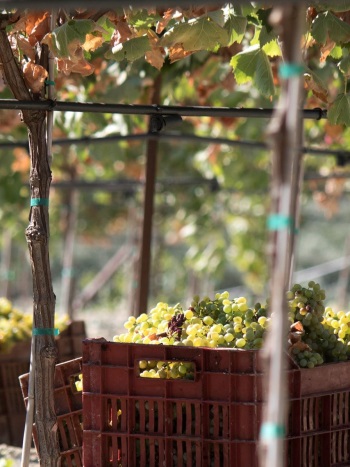Crete, the largest of the Greek islands, boasts a rich viticultural heritage that dates back over 4,000 years. The island’s diverse climate and fertile soils create the perfect conditions for producing high-quality wines. Today, traditional Cretan wine-making demonstrations offer a unique opportunity for visitors to explore this ancient craft, learn about the history and techniques of wine production, and savor the distinct flavors of Cretan wines.
The History of Cretan Wine
Wine-making in Crete has its roots in the Minoan civilization, which thrived from around 2600 to 1100 BCE. Archaeological discoveries, such as wine presses and amphorae used for storage and transport, provide evidence of the sophisticated wine-making practices of the Minoans. This long-standing tradition has been passed down through generations, with each era contributing its own techniques and innovations.
During the Roman and Byzantine periods, Cretan wines gained international acclaim, being exported throughout the Mediterranean. Venetian rule in the 13th to 17th centuries further enhanced the island’s reputation as a premier wine-producing region. Today, Crete continues to honor its wine-making heritage while incorporating modern advancements to produce some of Greece’s finest wines.
Traditional Wine-Making Techniques
Traditional Cretan wine-making involves several key stages, from vineyard management and grape harvesting to fermentation and aging. Many wine-making demonstrations on the island focus on these time-honored methods, offering participants a hands-on experience.
- Vineyard Tours and Grape Harvesting
The journey begins in the vineyard, where visitors learn about the different grape varieties grown in Crete, such as Vidiano, Liatiko, Kotsifali, and Mandilari. Vineyard tours often include explanations of sustainable farming practices, the importance of soil and climate, and the meticulous care that goes into tending the vines.
During the grape harvest season, typically from August to October, visitors can participate in the harvesting process. Picking grapes by hand, as it has been done for centuries, allows participants to connect with the land and understand the significance of timing and selection in producing high-quality wine.
- Crushing and Fermentation
After harvesting, the grapes are transported to the winery for crushing. Traditional methods often involve foot-stomping the grapes in large wooden vats, a practice that dates back to ancient times. This method is not only effective but also gentle on the grapes, ensuring that the skins and seeds do not break, which could impart unwanted bitterness to the wine.
The crushed grapes, or must, are then left to ferment. During wine-making demonstrations, participants can observe the natural fermentation process, where wild yeasts from the grape skins convert the sugars in the must into alcohol. This process is often carried out in large clay or wooden vats, highlighting the traditional techniques that give Cretan wines their unique character.
- Pressing and Aging
Once fermentation is complete, the wine is pressed to separate the liquid from the solids. Traditional Cretan wine-making often utilizes manual presses, allowing for precise control over the process. The wine is then transferred to aging vessels, which may include clay amphorae, wooden barrels, or stainless steel tanks, depending on the desired style and flavor profile.
Aging can vary from a few months to several years, during which the wine develops its complexity and depth. Demonstrations often include tastings of wines at different stages of aging, providing insights into how time and storage conditions influence the final product.
Wine Tasting and Cultural Experience
Traditional Cretan wine-making demonstrations are not complete without a tasting session. Visitors are guided through the nuances of Cretan wines, learning to appreciate the aromas, flavors, and textures that characterize different varieties. Tastings are often accompanied by traditional Cretan meze, such as dakos, olives, and local cheeses, highlighting the harmonious pairing of wine and food.
- Wine Festivals and Events
Throughout the year, Crete hosts numerous wine festivals and events that celebrate the island’s vinicultural heritage. These festivals often feature traditional music and dance, local cuisine, and, of course, wine tastings. Participating in these events provides a deeper understanding of the cultural significance of wine in Cretan society and offers a festive atmosphere for enjoying local wines.
- Educational Workshops
For those keen on delving deeper into the art of wine-making, educational workshops are available. These sessions cover a range of topics, from advanced tasting techniques and wine pairing principles to the science behind fermentation and aging. Workshops often include visits to multiple wineries, allowing participants to compare different styles and methods.
Preserving Tradition in Modern Times
While modern technology has introduced efficiencies and new possibilities to wine-making, many Cretan producers remain committed to traditional methods. This blend of old and new ensures that the unique qualities of Cretan wines are preserved while meeting contemporary standards of quality and sustainability.
Efforts to protect indigenous grape varieties and traditional wine-making techniques are supported by local cooperatives and international organizations. These initiatives aim to safeguard the island’s vinicultural heritage for future generations and promote Cretan wines on the global stage.
Conclusion
Experiencing traditional Cretan wine-making is more than just a culinary adventure; it is a journey into the heart of Crete’s cultural and historical identity. From the vineyard to the glass, each step of the process reflects the island’s deep-rooted connection to the land and its people. By participating in wine-making demonstrations, visitors not only gain a greater appreciation for Cretan wines but also contribute to the preservation of a timeless tradition. Whether you are a wine connoisseur or a curious traveler, the rich flavors and stories of Cretan wine-making promise an unforgettable experience.


